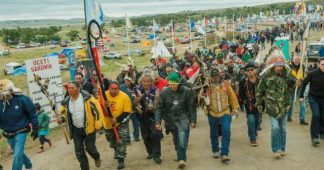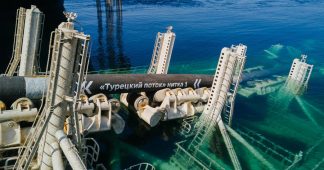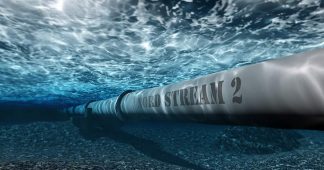Authorities said the risky low-flying maneuver was used to warn demonstrators to disperse, but the reasoning doesn’t hold up.
By Alleen Brown, Sam Richards
Ju
The largest civil disobedience yet against new pipeline construction in Minnesota was met by a furious response — and a cloud of debris. A Department of Homeland Security Border Patrol helicopter descended on the protest against the Enbridge Line 3 tar sands pipeline, kicking up dust and showering demonstrators with sand, in an unusual attempt to disperse the crowd.
“I couldn’t see because it got in my eyes,” said Big Wind, a 28-year-old Northern Arapaho organizer with the anti-pipeline Giniw Collective, who was there when the helicopter swooped over the civil disobedience action. “After it pulled up there were a lot of people who were ducking, who were in the fetal position, just because they didn’t know what was going to happen and were trying to protect themselves from the sand.”
The low-flying federal helicopter is an early signal of how law enforcement in Minnesota will deploy more than a year’s worth of training and preparations against what pipeline opponents have promised will be a summer of resistance. The tactic — which was criticized because of the extremely low flyover — suggests that the multiagency law enforcement coalition overseeing the police response is willing to bend safety standards in order to break up demonstrations.
Pipeline opponents, who identify as water protectors, say the point of the helicopter’s activity seemed to be to use the dust to intimidate and scatter the crowd. Big Wind said they heard no dispersal order coming from the helicopter. “I perceive this to be a tactic they utilized to deter people from arriving in large masses,” they said. “That’s not safe.”
Authorities later claimed that the helicopter was being used to make an announcement for demonstrators to disperse, but the announcement was inaudible to many demonstration participants. “There were rumors that it was saying something, but I couldn’t hear anything,” said Kate Sugarman, a 60-year-old pipeline opponent who was standing on the public road when the helicopter arrived. “To those of us on the ground it felt like a scary encounter, and it was not a way to easily send a message.”
Hours later, police, according to witnesses, used a sound amplification device called a Long Range Acoustic Device, or LRAD, at the site to make announcements — raising questions about why the helicopter was necessary at all.
“After the helicopter attempt proved not to be feasible for repeat messaging, the LRAD was brought in,” said John Elder, a spokesperson for the Northern Lights Task Force, which was set up to coordinate law enforcement’s response to the anti-pipeline movement “The LRAD was used to provide dispersal orders as well as post arrest directions.”
Authorities arrested more than 100 people present at the direct action protest
DHS/Border Patrol is using helicopter rotor wash to try to clear out activists out from an occupied #Line3 pump station north of Park Rapids. More than 24 activists are locked down to equipment inside. @MPRnews pic.twitter.com/ArTN6FAqwC
— Evan Frost (@efrostee) June 7, 2021
Failed Announcement
The anti-pipeline protests are in response to plans from the Canadian energy firm Enbridge to ramp up construction as a springtime hiatus lifts. Enbridge is preparing to drill under northern Minnesota rivers that are central to the lifeways of local Ojibwe people — and are protected by treaties between tribes and the federal government. Pipeline opponents have for weeks asserted that this weekend’s Treaty People Gathering would draw more than 1,000 people to northern Minnesota to fight the tar sands pipeline.
On Monday morning, according to a press release, more than 500 people occupied a pipeline pump station, north of Park Rapids, Minnesota, blocking the entrance to the site and locking down equipment. At another site, more than 1,000 people held a ceremony where the new pipeline will cross the Mississippi River, near its headwaters. Local and state law enforcement, coordinating under the aegis of the Northern Lights Task Force, spent last fall and winter preparing for protests around the river-crossing areas.
The Northern Lights Task Force provided a justification for the low flight on its Facebook page. “A helicopter from U.S. Customs and Border Protection was brought in today to issue a dispersal order to a large group of people in the area of Two Inlets Pump Station by Park Rapids, MN. The idea was to provide the order in a manner that everyone would be able to hear.”
The approach did not work. According to video captured by reporters and water protectors on the ground, the messages the helicopter sent were unintelligible, drowned out by the sound of the aircraft’s blades.
The task force said the debris was unintentional. “Unforeseen to local law enforcement and due to the extremely dry conditions, dust kicked up in the area,” the task force said on Facebook. “As soon as helicopter staff saw what was happening, they immediately left the area to ensure no further issues would be caused. This was not an intentional act to cause discomfort or intended as a dispersal mechanism.”
Helicopters Against Dissent
Buzzing civilian protesters engaged in First Amendment protected activity with helicopters is widely considered to be a dangerous tactic — and may stand in contravention of federal regulations on both civil and public flights.
The Code of Federal Regulations mandates that “except when necessary for takeoff or landing” aircraft must fly high enough so that if a power unit failed, the aircraft could perform an emergency landing “without undue hazard to persons or property on the surface.” In this case, the helicopter was not only flying above a group of people locked to equipment, but also the property and equipment itself, which are considered “critical infrastructure” by the Department of Homeland Security.
Footage shows the Homeland Security helicopter was flying around 20 feet above the ground.
“U.S. Customs and Border Protection responded to a local law enforcement request for assistance to address a gathering of people who were reported to have trespassed on private property,” a spokesperson for Customs and Border Protection, the parent agency of the Border Patrol, said. “CBP’s headquarters is investigating the facts to determine precisely what occurred and whether the actions taken were justified. All appropriate actions will be taken based on the facts that are learned, including with respect to the incident itself as well as the agency’s applicable policies and procedures.”
In recent years, the apparently proliferating tactic of buzzing protesters with dangerously low-flying helicopters has garnered criticism in the U.S. — especially following an incident in Washington, D.C., almost exactly a year ago. During a protest against police brutality after George Floyd was killed by police officers in Minnesota, Army UH-72 Lakota helicopters were used to intimidate demonstrators in the nation’s capital by hovering just above street level
Helicopter parked over a crowd at 5/E St Nw #WashingtonDCProtest trying to force ppl away with noise and wind pic.twitter.com/x0AcC3ob0S
— Daniella Cheslow (@DaniellaCheslow) June 2, 2020
News reports and widespread concern over the aggressive tactic prompted reviews by the Pentagon, which later concluded it was a misuse of military aircraft. The soldiers involved in the incident were disciplined.
The helicopters in Washington were flying further above the crowds than the Homeland Security helicopter that buzzed anti-pipeline protesters in Minnesota.
The helicopter hovering above the Line 3 demonstration has also previously been used against Black Lives Matter activists. The same aircraft, which frequently operates under the call sign Omaha49, was documented circling the site where Floyd was killed after the area was nonviolently occupied by activists and dubbed George Floyd Square.
When protests erupted in April following the police killing of Daunte Wright in the Minneapolis suburb of Brooklyn Center, the same helicopter was among a group of Homeland Security aircraft that circled on a near daily basis over protests and unrest across the Twin Cities.
A Homeland Security helicopter was also used earlier this year in a flyover of a protest encampment against the Line 3 pipeline, according to witnesses. (Elder, the Northern Lights Task Force spokesperson, said he was unaware of the helicopter’s previous use.)
In George Floyd Square and other Twin Cities unrest, the Homeland Security helicopter was flying at many thousands of feet higher than the height it was observed at and filmed over the protest Monday afternoon.
Reimbursed Megaphones
The Northern Lights Task Force was set up in many ways to avoid the pitfalls of the movement to stop the Dakota Access pipeline at Standing Rock, in North Dakota, which was marked by high-profile incidents of law enforcement and private security repression. Videos and images of authorities using dog attacks and water hoses in freezing temperatures stoked outrage across the country.
The task force carried out extensive preparations for helicopter and drone operations in the year leading up to construction via a subcommittee dedicated specifically to air operations, according to records obtained by The Intercept through public information requests. A key concern was how and where drone surveillance footage would be streamed.
Law enforcement was coordinating with federal officials on air operations long before construction began. Notes from a January 29, 2020, meeting of the Northern Lights Task Force appear to indicate a federal agent designated as point person for requests for air assistance. The bullet point is labeled “FBI Border Patrol,” followed by the name of an agent and the description “drone flyover requests and capabilities.”
A Northern Lights Task Force’s Concept of Operations document, previously published by The Intercept, contains detailed dispersal order scripts, but never suggests that such orders might be given from an aircraft.
Police certainly had other options. As of the end of May, Enbridge reimbursed $1,086,361 to agencies and organizations responding to public safety issues related to the pipeline, through a special escrow account created by the Minnesota Public Utilities Commission. Most of the money has gone to sheriffs’ offices responding to pipeline resistance. The Beltrami County Sheriff’s Office, which was among the agencies responding to the protests Monday, was reimbursed by Enbridge this year for a megaphone, a tool designed specifically for communicating with a crowd.
“Megaphones are a great tool when you have a smaller crowd and a smaller area of cover in which you convey a message,” said Elder, the Northern Lights Task Force spokesperson. “With a crowd this size and an area this impacted, we had to elevate the ability to deliver the message.”
By Tuesday morning, a few water protectors remained locked to infrastructure. Meanwhile, the demonstration at the Mississippi River had quietly transformed into an occupation. Along a boardwalk Enbridge workers set up through the wetlands, connecting the highway to a riverside construction site, water protectors set up an estimated 100 tents, along with food stations and places to use the bathroom.
“I don’t think that it’s going to stop,” said Big Wind. “People are going to continue to put their bodies on the line, are going to continue to risk their freedom to protect this land.”
Published at theintercept.com










